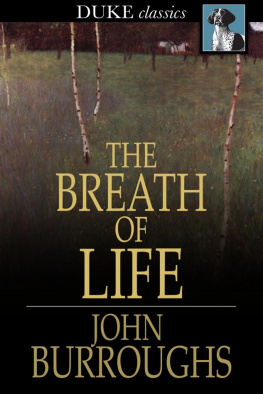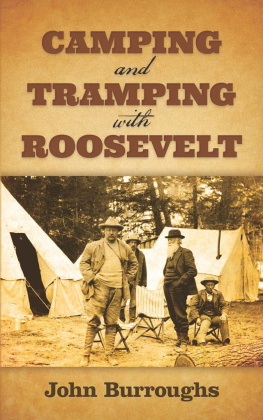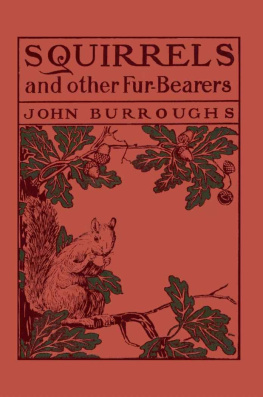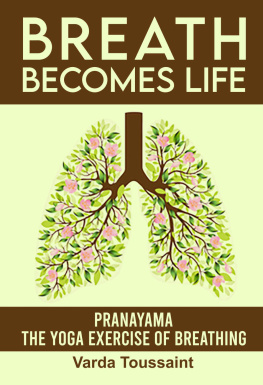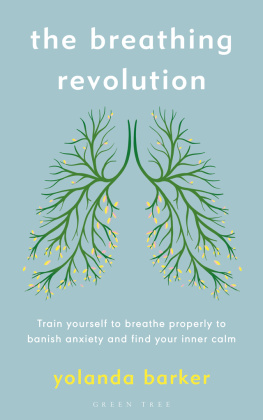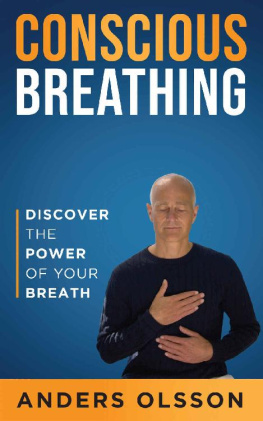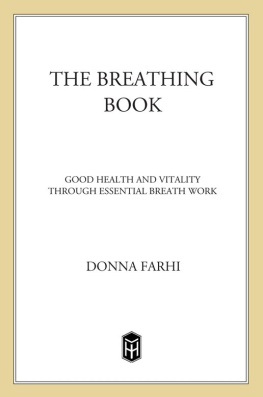John Burroughs - The Breath of Life
Here you can read online John Burroughs - The Breath of Life full text of the book (entire story) in english for free. Download pdf and epub, get meaning, cover and reviews about this ebook. publisher: Duke Classics, genre: Science. Description of the work, (preface) as well as reviews are available. Best literature library LitArk.com created for fans of good reading and offers a wide selection of genres:
Romance novel
Science fiction
Adventure
Detective
Science
History
Home and family
Prose
Art
Politics
Computer
Non-fiction
Religion
Business
Children
Humor
Choose a favorite category and find really read worthwhile books. Enjoy immersion in the world of imagination, feel the emotions of the characters or learn something new for yourself, make an fascinating discovery.
- Book:The Breath of Life
- Author:
- Publisher:Duke Classics
- Genre:
- Rating:5 / 5
- Favourites:Add to favourites
- Your mark:
- 100
- 1
- 2
- 3
- 4
- 5
The Breath of Life: summary, description and annotation
We offer to read an annotation, description, summary or preface (depends on what the author of the book "The Breath of Life" wrote himself). If you haven't found the necessary information about the book — write in the comments, we will try to find it.
Much of the time, our bodies carry out the process of respiration without our conscious involvement. But when you stop to really ponder the miraculous nature of breathing, as author John Burroughs does at length in The Breath of Life, this seemingly automatic act takes on greater meaning and significance. This volume is recommended for anatomy buffs, those with an appreciation for natural philosophy, and readers who are interested in exploring the benefits of deep-breathing techniques.
The Breath of Life — read online for free the complete book (whole text) full work
Below is the text of the book, divided by pages. System saving the place of the last page read, allows you to conveniently read the book "The Breath of Life" online for free, without having to search again every time where you left off. Put a bookmark, and you can go to the page where you finished reading at any time.
Font size:
Interval:
Bookmark:

First published in 1915
ISBN 978-1-62011-189-5
Duke Classics
2012 Duke Classics and its licensors. All rights reserved.
While every effort has been used to ensure the accuracy and reliability of the information contained in this edition, Duke Classics does not assume liability or responsibility for any errors or omissions in this book. Duke Classics does not accept responsibility for loss suffered as a result of reliance upon the accuracy or currency of information contained in this book.
As life nears its end with me, I find myself meditating more and moreupon the mystery of its nature and origin, yet without the least hopethat I can find out the ways of the Eternal in this or in any otherworld. In these studies I fancy I am about as far from mastering themystery as the ant which I saw this morning industriously exploring asmall section of the garden walk is from getting a clear idea of thegeography of the North American Continent. But the ant was occupied andwas apparently happy, and she must have learned something about a smallfraction of that part of the earth's surface.
I have passed many pleasant summer days in my hay-barn study, or underthe apple trees, exploring these questions, and though I have not solvedthem, I am satisfied with the clearer view I have given myself of themystery that envelops them. I have set down in these pages all thethoughts that have come to me on this subject. I have not aimed so muchat consistency as at clearness and definiteness of statement, letting mymind drift as upon a shoreless sea. Indeed, what are such questions, andall other ultimate questions, but shoreless seas whereon the chiefreward of the navigator is the joy of the adventure?
Sir Thomas Browne said, over two hundred years ago, that in philosophytruth seemed double-faced, by which I fancy he meant that there wasalways more than one point of view of all great problems, oftencontradictory points of view, from which truth is revealed. In thefollowing pages I am aware that two ideas, or principles, struggle in mymind for mastery. One is the idea of the super-mechanical and thesuper-chemical character of living things; the other is the idea of thesupremacy and universality of what we call natural law. The firstprobably springs from my inborn idealism and literary habit of mind; thesecond from my love of nature and my scientific bent. It is hard for meto reduce the life impulse to a level with common material forces thatshape and control the world of inert matter, and it is equally hard forme to reconcile my reason to the introduction of a new principle, or tosee anything in natural processes that savors of the ab-extra. It isthe working of these two different ideas in my mind that seems to giverise to the obvious contradictions that crop out here and therethroughout this volume. An explanation of life phenomena that savors ofthe laboratory and chemism repels me, and an explanation that savors ofthe theological point of view is equally distasteful to me. I crave andseek a natural explanation of all phenomena upon this earth, but theword "natural" to me implies more than mere chemistry and physics. Thebirth of a baby, and the blooming of a flower, are natural events, butthe laboratory methods forever fail to give us the key to the secret ofeither.
I am forced to conclude that my passion for nature and for all open-airlife, though tinged and stimulated by science, is not a passion for purescience, but for literature and philosophy. My imagination and ingrainedhumanism are appealed to by the facts and methods of natural history. Ifind something akin to poetry and religion (using the latter word in itsnon-mythological sense, as indicating the sum of mystery and reverencewe feel in the presence of the great facts of life and death) in theshows of day and night, and in my excursions to fields and woods. Thelove of nature is a different thing from the love of science, though thetwo may go together. The Wordsworthian sense in nature, of "somethingfar more deeply interfused" than the principles of exact science, isprobably the source of nearly if not quite all that this volume holds.To the rigid man of science this is frank mysticism; but without a senseof the unknown and unknowable, life is flat and barren. Without theemotion of the beautiful, the sublime, the mysterious, there is no art,no religion, no literature. How to get from the clod underfoot to thebrain and consciousness of man without invoking something outside of,and superior to, natural laws, is the question. For my own part Icontent myself with the thought of some unknown and doubtless unknowabletendency or power in the elements themselvesa kind of universal mindpervading living matter and the reason of its living, through which thewhole drama of evolution is brought about.
This is getting very near to the old teleological conception, as it isalso near to that of Henri Bergson and Sir Oliver Lodge. Our mindseasily slide into the groove of supernaturalism and spiritualism becausethey have long moved therein. We have the words and they mould ourthoughts. But science is fast teaching us that the universe is completein itself; that whatever takes place in matter is by virtue of the forceof matter; that it does not defer to or borrow from some other universe;that there is deep beneath deep in it; that gross matter has itsinterior in the molecule, and the molecule has its interior in the atom,and the atom has its interior in the electron, and that the electron ismatter in its fourth or non-material statethe point where it touchesthe super-material. The transformation of physical energy into vital,and of vital into mental, doubtless takes place in this invisible innerworld of atoms and electrons. The electric constitution of matter is adeduction of physics. It seems in some degree to bridge over the chasmbetween what we call the material and the spiritual. If we are notwithin hailing distance of life and mind, we seem assuredly on the roadthither. The mystery of the transformation of the ethereal, imponderableforces into the vital and the mental seems quite beyond the power of themind to solve. The explanation of it in the bald terms of chemistry andphysics can never satisfy a mind with a trace of idealism in it.
The greater number of the chapters of this volume are variations upon asingle theme,what Tyndall called "the mystery and the miracle ofvitality,"and I can only hope that the variations are of sufficientinterest to justify the inevitable repetitions which occur. I am no moreinclined than Tyndall was to believe in miracles unless we nameeverything a miracle, while at the same time I am deeply impressed withthe inadequacy of all known material forces to account for the phenomenaof living things.
That word of evil repute, materialism, is no longer the black sheep inthe flock that it was before the advent of modern transcendentalphysics. The spiritualized materialism of men like Huxley and Tyndallneed not trouble us. It springs from the new conception of matter. Itstands on the threshold of idealism or mysticism with the door ajar.After Tyndall had cast out the term "vital force," and reduced allvisible phenomena of life to mechanical attraction and repulsion, afterhe had exhausted physics, and reached its very rim, a mighty mysterystill hovered beyond him. He recognized that he had made no step towardits solution, and was forced to confess with the philosophers of allages that
"We are such stuff
As dreams are made on, and our little life
Font size:
Interval:
Bookmark:
Similar books «The Breath of Life»
Look at similar books to The Breath of Life. We have selected literature similar in name and meaning in the hope of providing readers with more options to find new, interesting, not yet read works.
Discussion, reviews of the book The Breath of Life and just readers' own opinions. Leave your comments, write what you think about the work, its meaning or the main characters. Specify what exactly you liked and what you didn't like, and why you think so.

